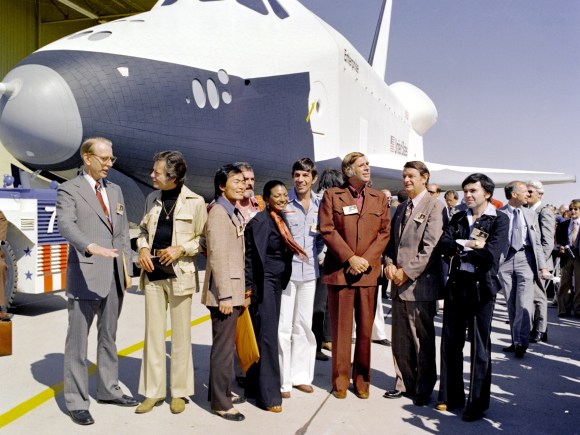
Editor’s note: David Fuchs has written 49 “featured” articles on Wikipedia; all have been assessed by peer editors against stringent criteria. Several are about Star Trek, the science fiction series that has astounded and inspired millions of people since its debut in 1966, including articles on all six of the original films and on the villainous Khan Noonien Singh.
There’s no time in my life I can’t recall watching the science fiction franchise Star Trek. Even at a young age, I can recall watching old VHS tapes of the original 1960s series at my uncle’s; the Halloween episode “Catspaw” gave young me nightmares. As I grew up, airings of the newest episodes of Deep Space Nine, Voyager, and Enterprise were occasions that my entire family would get together and vocal actor. The end of high school coincided with the ignominious cancellation of the latter series, and I was in college when the rebooted J.J. Abrams-helmed Star Trek was released.
I’ve focused on a lot of different subjects during my career on Wikipedia—paleontological history, video games, books—but my work on Star Trek is something I’m particularly proud of. Alone, or occasionally with a few excellent collaborators, I’ve contributed to twelve “featured” articles on the Star Trek franchise, including the entire run of films from Star Trek: The Motion Picture to Star Trek VI: The Undiscovered Country.
I’ve always been drawn to writing about media on Wikipedia because I see it as a way of using my enthusiasm as a form of entertainment and education. As entertaining or boring as a movie might be, there’s an entirely different story lurking behind what ends up on screen, and I’ve found that those stories are often as engrossing as the final products. Much like Wikipedia, viewers or readers see a final product that was created only with the toil of many people behind the scenes, and in researching the Star Trek films and episodes in books, magazines, and on the web, stories ranging from the remarkable to the quiet, from the tragic to the comic, come up time and time again. As someone who found William Shatner’s performance in The Wrath of Khan remarkably affecting and subdued compared to the iconic scenery-chewing actor pop culture remembers him as, it was interesting to learn that director Nicholas Meyer evinced that performance from Shatner by boring the actor with repeated takes until he would stop hamming it up for the screen.
Delving into the production of Star Trek also gives some useful context in understanding the finished product. The fifth film, The Final Frontier, is often considered one of the worst in the series. Fault is often laid at director and cast member William Shatner’s feet, but in researching the subject I found that Shatner was faced with challenges that would have been tough for even an experienced director to handle, let alone a production that faced numerous setbacks, including a writers strike and sabotage of production vehicles. His ambitious, operatic film was cut down by budget woes and money poured into an unproven special effects house produced terrible results; the poor end results were less a result of Shatner’s purported ego, and more a novice director lacking support. The media we enjoy doesn’t spring fully-formed; it’s the effort of many people working together with different ideas and views, and in researching these articles you learn a bit more about them.
Finally, I enjoy writing about Star Trek because I hope that someone might read an article and get interested in the franchise as well. In today’s trying world climate, I think Star Trek is needed more than ever—an optimistic and remarkably apolitical vision of the future, where humanity has learned to come together for the greater good. It’s a hopeful spirit that is shared with the Wikipedia mission—that through easy access to knowledge, we can find some more understanding, and turn fiction into a better reality.
David Fuchs, Wikimedian

Can you help us translate this article?
In order for this article to reach as many people as possible we would like your help. Can you translate this article to get the message out?
Start translation